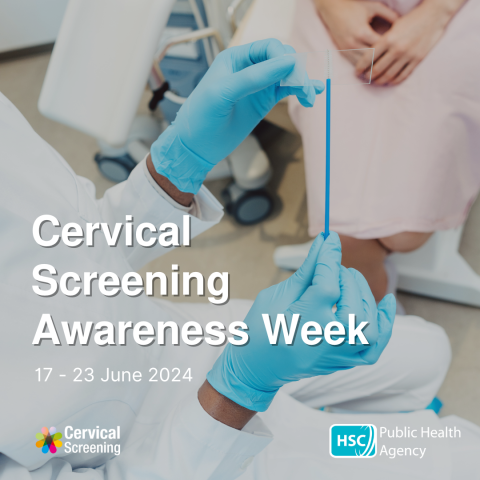Cervical Screening Awareness Week – join the thousands of young women who go for screening

This Cervical Screening Awareness Week [17–23 June], the Public Health Agency (PHA) is urging young women to go for their screening, as it is revealed while nearly two-thirds do attend when invited, those who don’t are missing out on a potentially life-saving opportunity.
In Northern Ireland, cervical screening is available to women and other people with a cervix aged 25–64. At the end of March 2023, just 60% of women aged 25-29 had come forward for a screening test within the previous five years, while 71% of those eligible overall had attended.
Dr Joanne McClean, Director of Public Health at the PHA, said: “Cervical cancer is one of the few cancers that can be prevented thanks to screening, so it is really important to attend for cervical screening when invited as it could save your life.”
Nearly all cervical cancers are caused by persistent infection with human papillomavirus, known as HPV. It is a very common virus – about 8 out of 10 people catch it at some point in their lives. The virus usually causes no symptoms and is mainly spread by skin-to-skin contact during sexual activity. In most cases, the body’s immune system will clear the virus and it doesn’t cause any problems, but in some people the virus can stay in the body for many years.
Last year, the Northern Ireland Cervical Screening Programme introduced primary HPV testing into the cervical screening pathway. This has improved the ability to detect early cell changes that could lead to cancer.
Dr McClean continued: “The introduction of primary HPV testing into the cervical screening pathway has been a positive development for the programme. Testing for HPV is a more accurate and effective way to identify women at risk of cell changes that could go on to develop into cancer if left untreated. The model is also enabling results to be delivered to women much more quickly.”
Cervical screening, as with all screening programmes, doesn’t guarantee that cancer will not develop in the future, although it significantly reduces the risk. A cancer could develop between screening tests, and there is a small chance that the screening test misses some changes in the cervix.
The HPV vaccine also helps to prevent HPV-related cancers from developing in young people. It is a one dose programme which is offered to pupils in Year 9 and given as an injection in the upper arm, the same way as many other vaccines.
Dr McClean concluded: “The HPV vaccine will help protect your child against HPV infection and associated cancers, including over 90% of cervical cancers in women, and cancers of the mouth, throat, anus and genitals in men and women, and against genital warts.
“When a young person receives the vaccine, their body will react by making antibodies that will help the immune system fight HPV infection. The vaccine cannot cause HPV infection or cancer. If you have been eligible for the vaccine but have not received it in school, you can still receive it free of charge until the age of 25. You can find out if you are eligible by contacting your GP surgery.
“Cervical cancer is a cancer that we can help prevent thanks to the HPV vaccination and cervical cancer screening programmes. We are confident that with good uptake of both we can drive down rates of cervical cancer to the point where it can almost be eliminated in years to come.”
Please see the following websites for further information.
- PHA site: www.pha.site/CervicalScreening1
- NI Direct – Cervical Screening: www.nidirect.gov.uk/articles/cervical-screening
- HPV: www.pha.site/HPVvaccination
- NI Direct – human papillomavirus (HPV): www.nidirect.gov.uk/conditions/human-papillomavirus-hpv
Find out more about the change to primary HPV testing by watching the following animation – www.vimeo.com/892265209?share=copy
